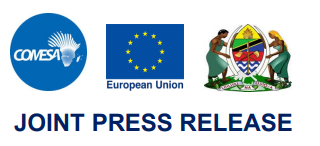
The COMESA Secretariat and the Government of the United Republic of Tanzania have jointly signed an agreement that sub-delegates the implementation of coordinated border management activities and construction of a border market at the Tunduma Tanzania-Zambia Border Post. The European Union allocated a total of EUR 2.7 million to this initiative under the COMESA Small-Scale Cross Border Trade Initiative (SSCBTI) and Trade Facilitation Programme (TFP), respectively. Upgrading the Tunduma border post feeds into the framework of the COMESA-EAC-SADC Tripartite Free Trade Agreement, whose main objective is the creation of a single economic area.
The progressive removal of trade barriers will facilitate trade and increase formal small scale trade flows between the two countries. Through the sub-delegation agreement, the United Republic of Tanzania will also receive support in the development of improved and harmonized regulatory frameworks and procedures at its border crossing with Zambia. In concrete terms, activities will focus on upgrading priority cross-border infrastructure and the procurement of equipment, which is needed to improve cross-border trade and transport facilitation at the Tunduma border post. The project will also support capacity building of border agencies and national stakeholders on coordinated border management, customs valuation, harmonized system classification, setting up and management of Joint Border Committees, risk management and “One Stop Border Post” procedures.
COMESA Secretary General, Ms. Chileshe M. Kapwepwe, and the Permanent Secretary from the Ministry of Industry and Trade of the United Republic of Tanzania, Mr. Doto M. James, signed the Sub-Delegation Agreement separately in Lusaka and Dodoma.
Mr. James thanked the COMESA Secretariat and the European Union for the continued development support in the United Republic of Tanzania. He indicated that, the support will be used to enhance operational efficiency of the Tunduma OSBP and rehabilitation/construction of Small-Scale Market at Majengo Area in Tunduma Town Council.
The Permanent Secretary also added that, generally, the support will further assist in boosting trade between the United Republic of Tanzania and the Republic of Zambia by improving efficiency and reducing the time for clearing goods between the two countries, thus contributing to a reduction in transport cost, whilst increasing volumes of transshipment cargo through Tunduma/Nakonde One Stop Border Post.
Speaking on behalf of COMESA, Ms. Kapwepwe said
“My expectation is that the stakeholders in Tanzania will embrace the programme and take advantage of this grant and ensure the implementation of our integration programmes among the beneficiaries,”.
Mr. Jacek Jankowski, Ambassador of the European Union to Zambia and Special Representative to COMESA commended the step taken by Tanzania’s authorities in the context of the Tripartite Agreement. He said “The Tunduma border post is the gateway to reaching a Free Trade Area and strengthen the relationships between the two regions, namely the EAC and COMESA.”
Mr. Manfredo Fanti, the Ambassador of the European Union in Tanzania and the East African Community stated:
“Tunduma border post is a node on an important transit route linking the ports of Dar es Salaam and the rest of Southern Africa. We are pleased to see that the upgrading of this border post will strengthen cross regional trade contributing to sustainable economic development in the region”.
COMESA will facilitate financial, logistical and administrative processes in line with its contractual obligations. The funds will follow the agreed action plan between COMESA and the United Republic of Tanzania and in line with the Covid-19 pandemic.
Background:
This project is funded under the 11th European Development Fund Small-Scale Cross Border Trade Initiative (SSCBTI), EUR 684,000 and Trade Facilitation Programme (TFP), EUR 1,954,000, through a EUR 65 million grant agreement of the EU with COMESA, signed in 2018. The two programmes have key result areas, covering among others, deepening regional integration, improving inclusive regional economic growth, institutional capacity building, better data collection and enhancing the competitiveness of the COMESA region.

